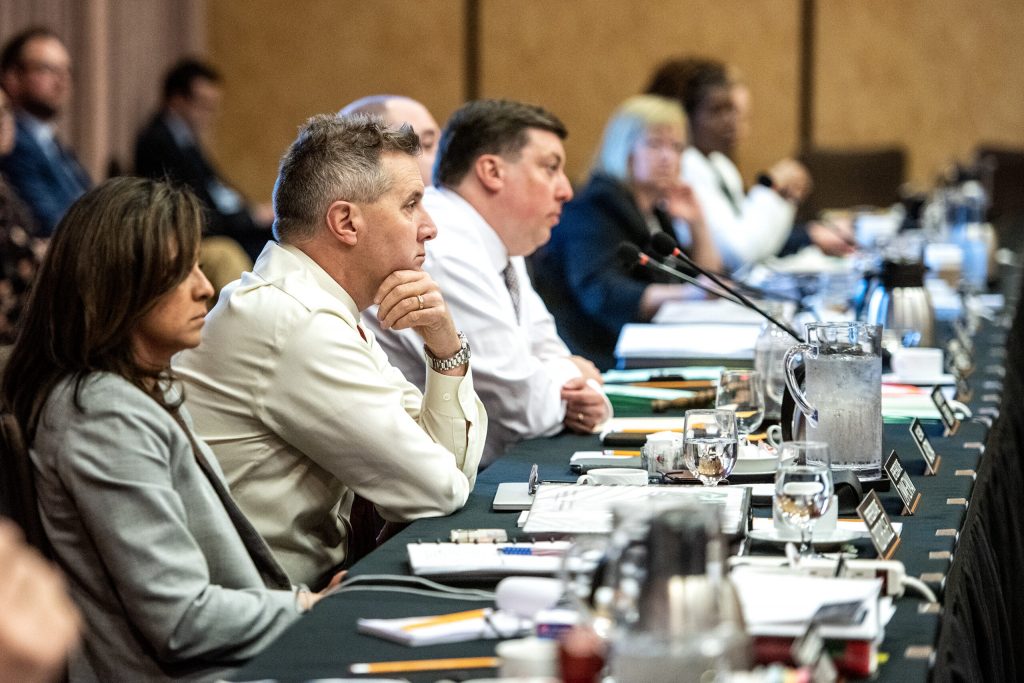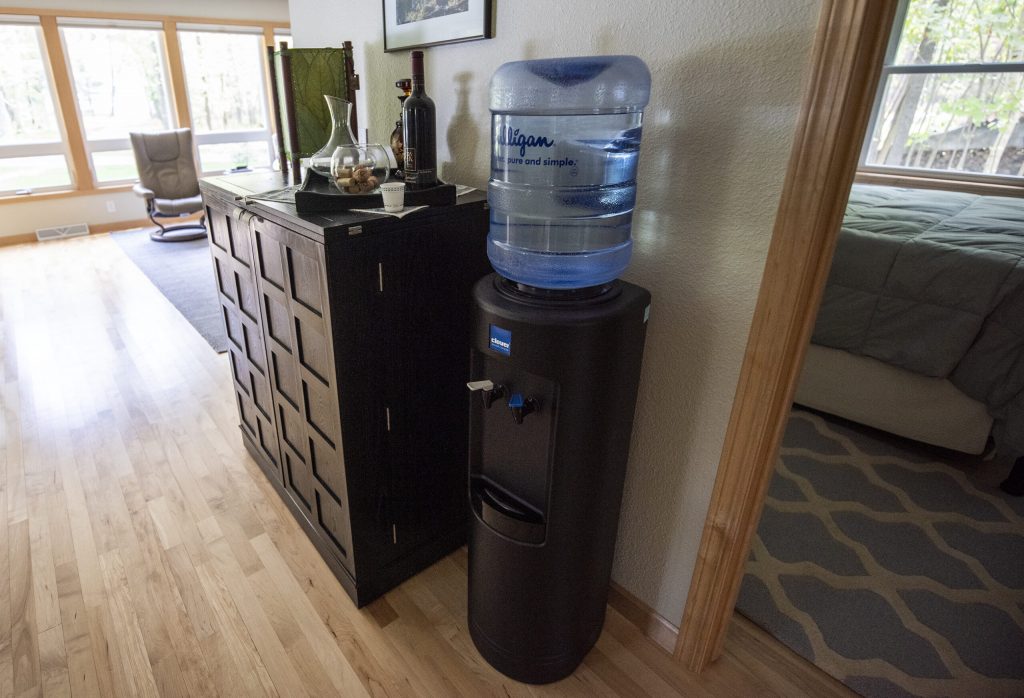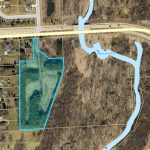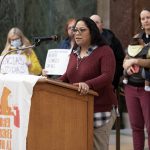Legislature’s Budget Committee Unanimously Boosts Clean Water Funding By $732 Million
Wisconsin communities are expected to submit applications for $1.6 billion worth of projects.

Rep. Shannon Zimmerman listens with other legislators during a Joint Finance Committee public hearing Wednesday, April 12, 2023, at the Wilderness Resort in Wisconsin Dells, Wis. Angela Major/WPR
The Wisconsin Legislature’s budget-writing committee unanimously voted to boost borrowing for the state’s revolving loan programs by more than $700 million to help communities fund upgrades to water infrastructure.
The Joint Committee on Finance voted Thursday to increase borrowing by $732.2 million under the state’s Environmental Improvement Fund, which includes the clean water fund and safe drinking water loan programs.
The committee also approved a $658.5 million increase to fund about 87 percent of anticipated financial need among communities. The state projects they will seek around $1.6 billion in loans for clean water and safe drinking water projects under the next two-year state budget, as well as nearly $1.3 billion in the 2027-29 biennium.
During Thursday’s meeting, committee co-chair State Sen. Howard Marklein, R-Green, said it’s a big deal for communities who rely on the state’s loan programs.
“We’ve had significant investments in a couple of my communities for wastewater treatment plants and upgrades in their water systems, but also there’s some unmet demand here,” Marklein said.
Marklein’s district is not alone. The Wisconsin Department of Natural Resources has seen surging demand from communities seeking financial assistance to fund projects under the two loan programs. Wisconsin was unable to fund costs from 24 projects totaling $73.9 million for wastewater and stormwater upgrades in the current fiscal year, according to the Legislative Fiscal Bureau.
Surging demand for loans to finance water projects
Demand spiked 154 percent over the 10-year average for the clean water fund and 325 percent for the safe drinking water loan program during the previous fiscal year. The DNR attributes the increased demand to additional funding from the Bipartisan Infrastructure Law that increased principal forgiveness, which are essentially grants that communities don’t have to pay back.
Supply chain disruptions and high inflation during the COVID-19 pandemic, as well as upcoming federal requirements to use construction materials produced in America, may have played a role in increased demand.
Rep. Deb Andraca, D-Whitefish Bay, said she’s thrilled the state is investing in infrastructure needs. She said Wisconsin’s $4 billion surplus should be used for infrastructure, noting communities in her district are facing increases between 50 and 196 percent in their water bills.
“These investments will not only help our communities replace lead infrastructure, some of which is 80-90 years old, but also avoid cost increases, which is something that we all should be very, very concerned about,” Andraca said Thursday.

Jeff Lamont has a water dispenser in his Peshtigo, Wis., home due to PFAS contamination in the tap water. Angela Major/WPR
Sen. Eric Wimberger and Rep. Todd Novak were among lawmakers who called for increased funding. In a statement, Wimberger said communities across Wisconsin are dealing with aging infrastructure and new contaminants like PFAS.
“With these additional funds, municipalities will be able to access low-interest loans to modernize their water systems, saving local taxpayers millions of dollars and keeping their water clean for years to come at the same time,” Wimberger said.
Peter Burgess, government affairs manager with Wisconsin Conservation Voters, said in a statement that bipartisan support for the program highlights the need for safe drinking water.
Toni Herkert, government affairs director with the League of Wisconsin Municipalities, also said in a statement that increased bonding would prompt public health, economic development and benefit ratepayers.
“After projects were unable to be funded for the first time in the program’s history due to an unanticipated surge in demand, substantial action was needed in this budget to prevent further project delays that risk community growth and regulatory non-compliance,” that statement reads. “The Joint Finance Committee met this challenge head-on and provided the substantial investment that will pay dividends for decades to come in Wisconsin communities.”
The investment comes as the Wisconsin Department of Natural Resources could lose $55 million for loan programs under proposed budget cuts to the Environmental Protection Agency in 2026. President Donald Trump’s administration has said states should be responsible for funding their own water projects.
Legislature’s budget-writing committee boosts borrowing by $732M for water programs was originally published by Wisconsin Public Radio.
If you think stories like this are important, become a member of Urban Milwaukee and help support real, independent journalism. Plus you get some cool added benefits.
More about the PFAS Problem
- DNR and DHS Issue New PFAS-based Consumption Advisory for Ducks Harvested on Green Bay - Wisconsin Department of Natural Resources - Sep 4th, 2025
- DNR and DHS Issue New PFAS-based Consumption Advisories for Fish and Deer Near town of Stella and Surrounding Waterbodies in Oneida County - Wisconsin Department of Natural Resources - Sep 4th, 2025
- Groundwater Coordinating Council Releases 2025 Report to the Legislature - Wisconsin Department of Natural Resources - Sep 2nd, 2025
- Environmental Groups, Community Advocates Push for PFAS Deal - Henry Redman - Jul 14th, 2025
- Environmental Advocates Hail Wisconsin Supreme Court Decision in Evers v Marklein - Midwest Environmental Advocates - Jul 8th, 2025
- Wisconsin Supreme Court Backs State Regulators of PFAS Pollution - Danielle Kaeding and Rich Kremer - Jun 24th, 2025
- Gov. Evers Releases Statement on Wisconsin Supreme Court Decision in WMC Inc v. DNR - Gov. Tony Evers - Jun 24th, 2025
- Rep. Shelia Stubbs Elected Great Lakes-St. Lawrence Legislative Caucus Vice Chair of the Task Force on Emerging Contaminants - State Rep. Shelia Stubbs - Jun 16th, 2025
- Legislature’s Budget Committee Unanimously Boosts Clean Water Funding By $732 Million - Danielle Kaeding - Jun 6th, 2025
- Trump Administration moves to weaken standards for toxic ‘forever chemicals’ in drinking water - Clean Wisconsin - May 14th, 2025
Read more about PFAS Problem here




















